Posted: 09/12/14
Diamond celebrations bring together staff and students from across the decades
People that studied and worked at West Nottinghamshire College’s Derby Road campus in Mansfield, from its opening in 1954 to the present day, have celebrated its 60th anniversary.
-
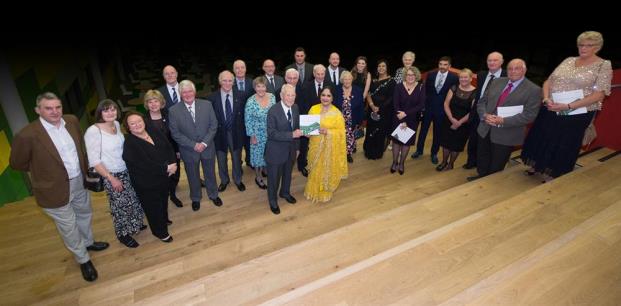
Dame Asha and Roy Broadley (centre) with some of the contributors to the book
-
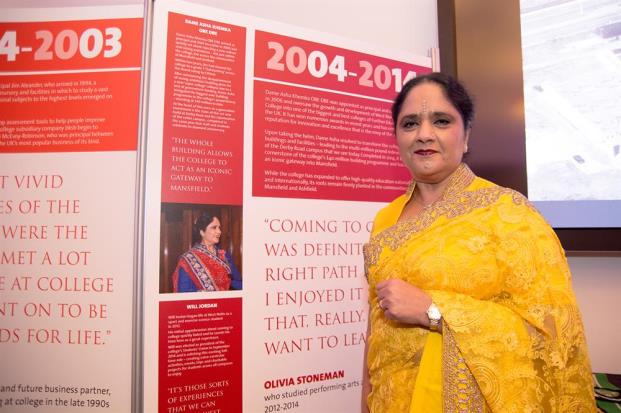
Dame Asha unveils the exhibition marking 60 years of life at Derby Road
-
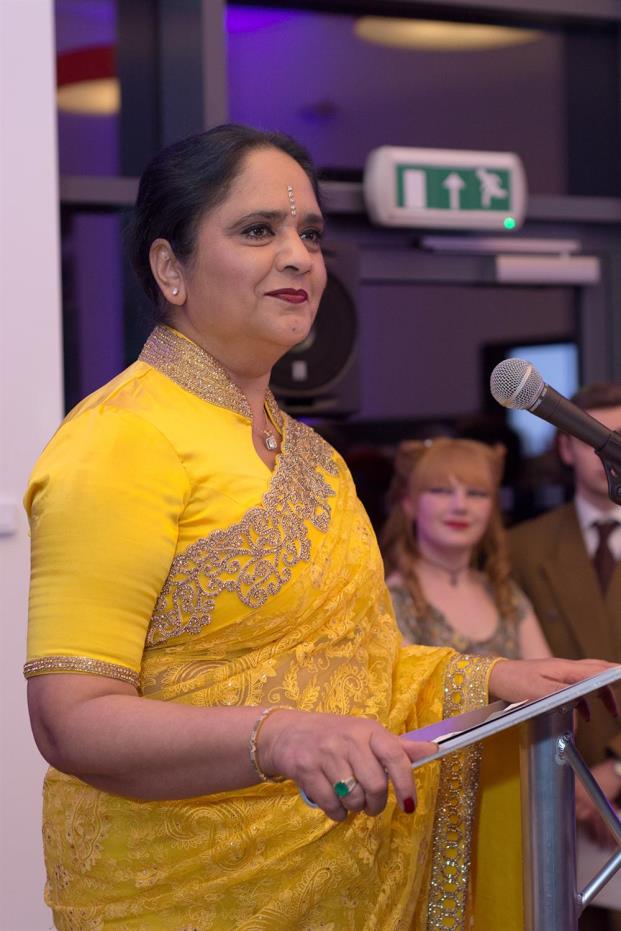
Dame Asha welcomes guests to the diamond celebrations
-
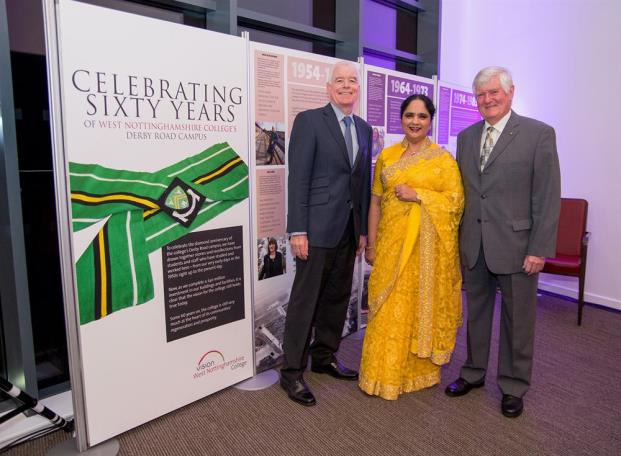
Dame Asha with former principals Jim Aleander (left) and Don Mackenzie (right)
-
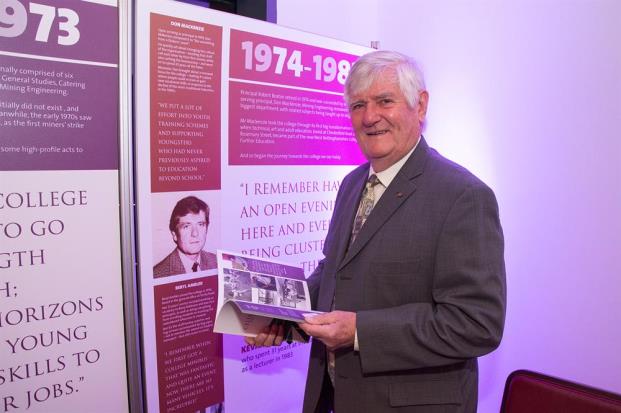
Don Mackenzie recalls his time at the college
-
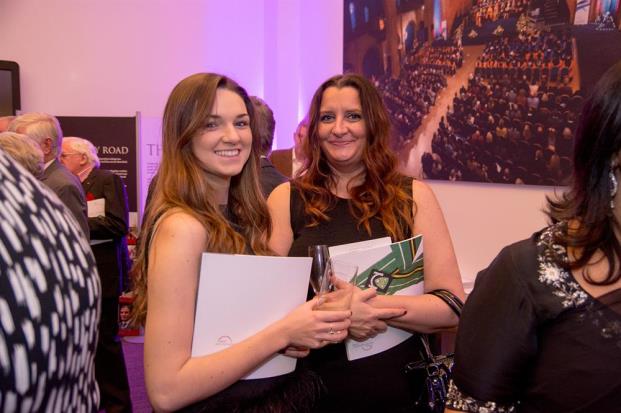
Former student Olivia Stoneman (left), who features in the book, with her mum Andrea Webber
-
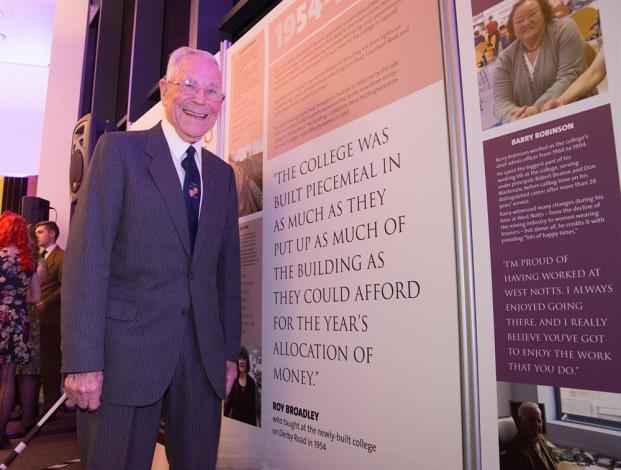
Former student-turned-tutor Roy Broadley takes in the exhibition
-
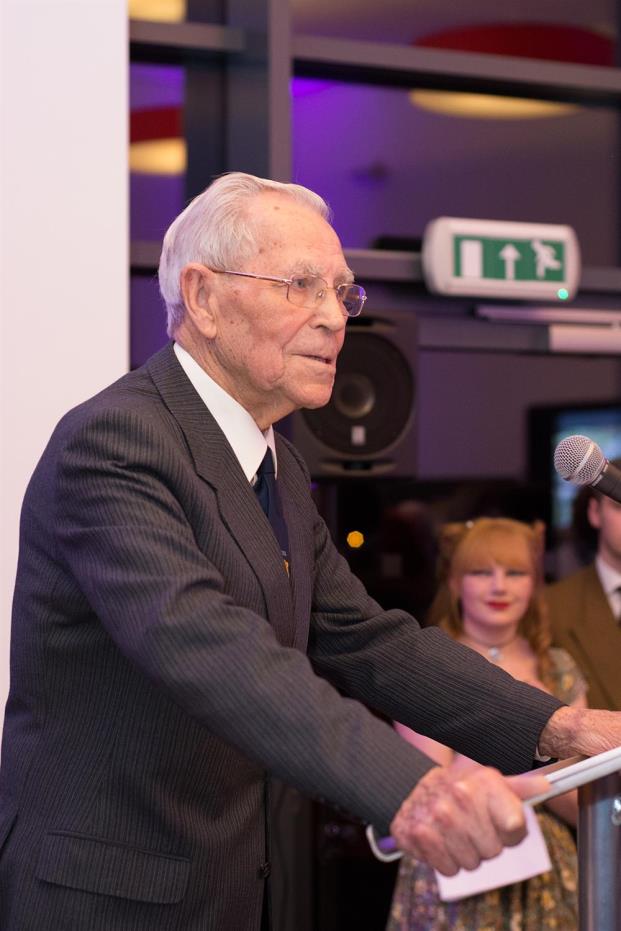
Guest of honour Roy Broadley addresses the audience
-
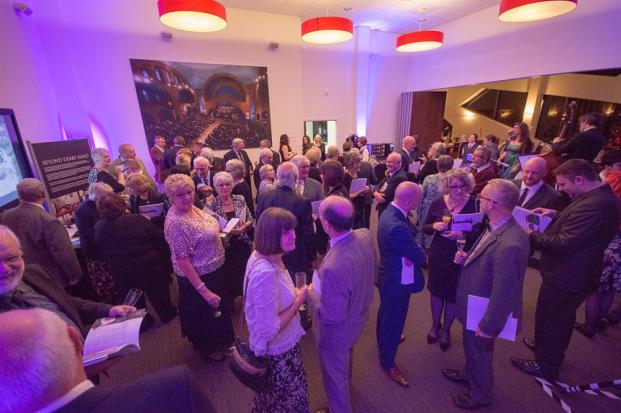
Guests gather for the diamond celebrations
-
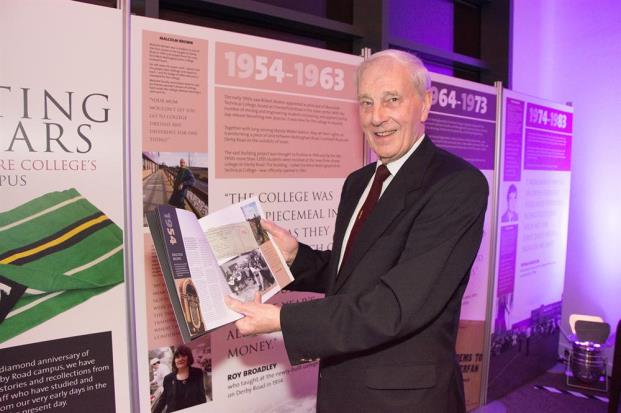
Malcolm Brown reads his contribution to the book
-
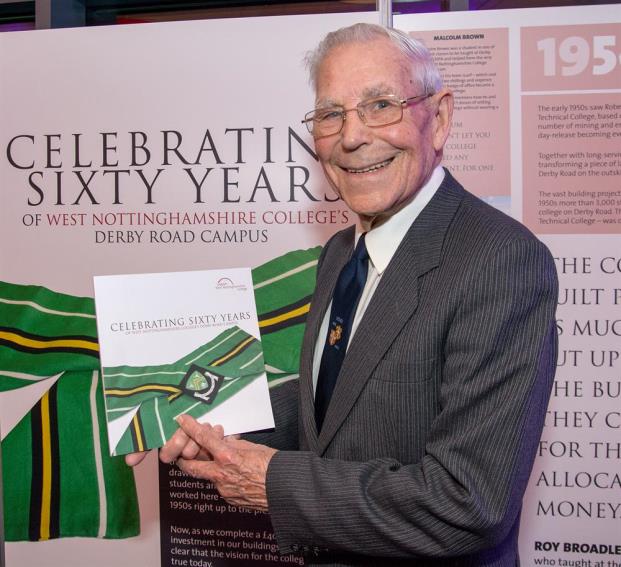
Roy Broadley proudly holds a copy of the commemorative book
-

Singer Jeanie Barton brings some 1950s glamour to the occasion
-
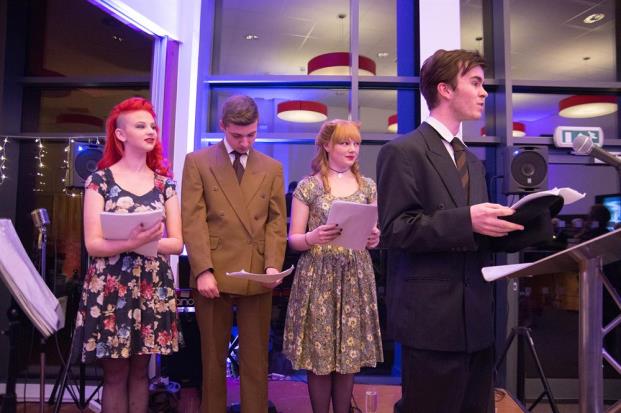
Students Lorna Gribbin, Connor Talbot, Frances Savage and Drew Scott Purkis read extracts from the book
-
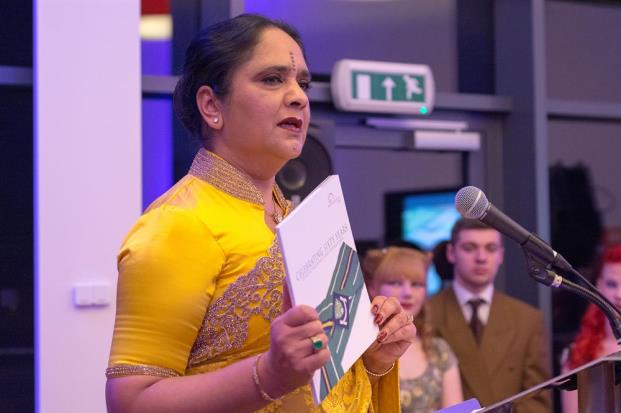
The book is a fitting tribute to the college, says Dame Asha
-
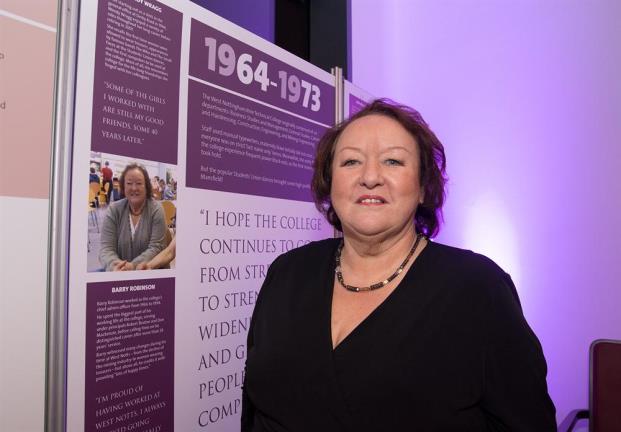
Wendy Wragg at the exhibition board that features her story
The college brought together students and staff from the last seven decades for a special evening celebration to commemorate the diamond anniversary of its main campus.
They included Roy Broadley, 88, who studied at the former Mansfield Technical College on Chesterfield Road in the early 1940s before going on to teach engineering at the newly-built Derby Road site when it opened in 1954; and former apprentice electrician Malcolm Brown, 76, who was one of its first students and helped set up the college football team.
Others included former colleagues Wendy Wragg, Eileen Matthews, Valerie Ward and Gill Kirk – who became life-long friends – and former principals Don Mackenzie and Jim Aleander, who led the college from 1974-1994, and 1994-2001 respectively.
Their fascinating stories are amongst more than 30 to be captured in a new limited-edition book, ‘Celebrating Sixty Years’, published by the college to celebrate the landmark birthday, which coincides with the completion of a £40 million redevelopment of its buildings and facilities across Mansfield and Ashfield.
The book tells the story of the evolution of the Derby Road campus as seen through the eyes of current and former staff, students and governors, who share their unique accounts of their time there.
Their anecdotes and recollections also serve as a social commentary of the college throughout the decades; from the rise of apprenticeships in the 1950s and appearances by popular bands The Who and The Small Faces – complete with instrument-smashing! – in the 1960s, to the boom in mining-related courses in the 1970s, before the miners’ strike of the 1980s led to the industry’s eventual decline.
The book also tells how the college was re-shaped in the 1990s after being freed from local authority-control, while the 2000s heralded a dynamic new era following the arrival of pioneering principal Dame Asha Khemka, who instigated the largest-ever building programme in the college’s history, completed last month – 60 years after Derby Road first opened its doors to students.
Many of these stories are replicated on an eye-catching exhibition tracing the college’s modest roots as a solitary, two-storey building that specialised in mining and engineering to becoming one of the largest and most successful further education colleges in the country.
Both the book and exhibition were unveiled at a special commemorative evening event (on Friday 5 December) at the Derby Road campus boasting live music by 1950s-style singer Jeanie Barton and her band; an address by Roy Broadley, making his first visit to the college since re-locating to Worthing, West Sussex, in December 1959; and extracts from the book read by present day performing arts students Connor Talbot, Drew Scott Purkis, Frances Savage and Lorna Gribbin, dressed in 1950s costume.
The exhibition is currently on display at Derby Road and the commemorative book, priced £5, on sale at its main reception.
We caught up with some of the book’s contributors at the evening celebration. Here’s what they told us:
Roy Broadley taught engineering at the newly-built West Nottinghamshire Technical College on Derby Road upon its opening in 1954.
He was involved in getting the two-storey building ready for its very-first students; planning the equipment that went in some of the workshops and labs.
“With more money available they built the third floor a year later, which became the refectory,” Roy recalls.
Roy, now 88, left in December 1959 to take up a lecturer’s post at Worthing College, where he remained until retiring in 1986. He still lives in Worthing with wife Joan.
After teturning to the college for the first time in 55 years and enjoying a tour of the campus, he said: “I had a lump in my throat the size of a duck egg. I was that overwhelmed. It was as though I had never been away – and yet the building looked totally different.
“It was very emotional and the celebrations could not have been any better.
“This was always a good college – but it’s a superb college now.”
Malcolm Brown was one of the first students at Derby Road in 1954, which he attended as an apprentice electrician.
He joined shortly before his 16th birthday after his father vowed to “break the family tradition” by not sending him to work down the coal mines.
Malcolm helped form the college’s first-ever football team and still owns his team scarf. Its badge and Latin motto ‘Work Conquers All’ became a standard for the college.
The retired electrician, 76, said: “I feel very honoured to be part of these diamond celebrations, especially seeing my picture in the book. I’m very proud of that. The college was a big part of my life.”
After starting as an office clerk in 1964, Wendy Wragg enjoyed a variety of roles throughout her long career – rising to the position of senior administrator – before retiring in 2001.
She has many fond memories of her time at the college, from appearances by famous bands The Who and The Small Faces, to the first time women were allowed to wear trousers and the introduction of computers.
Above all, she remembers college for the life-long friendships she formed with several of her colleagues – in particular Eileen Matthews, Valerie Ward and Gill Kirk, who were also guests at the 60th anniversary event.
“Some of the girls I worked with are still my good friends, some 45 years later,” said Wendy.
“Contributing to the book and being part of the event make you appreciate your friends from long ago and all the memories came flooding back. And of course, the building looks spectacular.”
Upon arriving as principal in 1974, Don Mackenzie compared it to “like something from a Charles Dickens’ novel”.
He quickly set about changing the culture of the organisation – insisting staff addressed each other by their first names, while also curbing the bureaucracy – and went on to spend 20 years at the helm before retiring in 1994.
Moreover, Don brought about a renewed focus for the college; making it a place where people could re-train or gain new vocational skills in response to the decline of the area’s traditional industries in the 1980s.
Don, who still lives in Mansfield, said: “I’d intended to only be here for five years but ended up staying for 20. That was mainly because of the people, and it was a good job in the sense that there was a lot to be done.
“I saw a lot of changes here, and there have been many more changes since I left.
“I’m delighted to be associated with the college and honoured that I am still remembered.”
Dame Asha Khemka arrived as principal and chief executive in 2006 and oversaw the growth and development of West Nottinghamshire College into one of the largest and most successful colleges in the UK.
Upon taking the helm, Dame Asha vowed to overhaul its ageing buildings to provide students with “truly inspirational learning facilities.”
Her determination led to the multi-million pound transformation of the Derby Road campus that we see today, which forms the cornerstone of the college’s £40 million building programme and serves as an “iconic” gateway into Mansfield.
Dame Asha said: “I am immensely proud to celebrate 60 years of Derby Road. From its modest beginnings as a solitary, two-storey building and workshops to a flagship, 21st century campus, it has been amazing to be part of its journey.
“The book captures seven decades of stories, feelings, experiences and emotions, and shows that the college has a very special place at the very heart of its communities.
“Here’s to the next 60 years and many more besides!”
The college’s Derby Road campus opened as West Nottinghamshire Technical College in 1954 after expanding out of the former Mansfield Technical College in Chesterfield Road, which opened in 1928. Its name changed to West Nottinghamshire College of Further Education in 1976 when it merged with the former Mansfield College of Arts to form one institution.
The college became known by its present name in 1993 following ‘incorporation’, which saw colleges leave local authority control and become independent organisations in their own right.